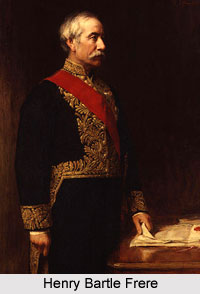 Henry Bartle Frere, formally known as Sir Henry Bartle Edward Frere, 1st Baronet, GCB, GCSI, served as the Governor of Bombay Presidency from the year 1862 to 1867, in former undivided India under the rule of the British East India Company. He was also one of the renowned a colonial administrators.
Henry Bartle Frere, formally known as Sir Henry Bartle Edward Frere, 1st Baronet, GCB, GCSI, served as the Governor of Bombay Presidency from the year 1862 to 1867, in former undivided India under the rule of the British East India Company. He was also one of the renowned a colonial administrators.
Early Life of Henry Bartle Frere
Henry Bartle Frere was born on 29 March 1815 at Clydach House, Clydach in Monmouthshire, Wales. He was the son of Edward Frere, who was the manager of Clydach Ironworks. Henry Bartle Frere successfully completed his education from the East India Company College in Hertford Heath, Hertfordshire, England, the predecessor of the later Haileybury and Imperial Service College.
Career of Henry Bartle Frere
After the completion of his graduation, Henry Bartle Edward Frere, 1st Baronet, was appointed as a writer in the Bombay (now Mumbai) civil service in the year 1834. He was later employed as assistant collector at Poona (now Pune) in 1835, after Frere passed his language examination. Later in 1842, he was assigned as private secretary to Sir George Arthur, the then Governor of Bombay Presidency. Henry Bartle Frere was eventually appointed as the Resident of British India or Political Agent at the court of the native ruler of the princely state of Satara. After the death of the Raja of Satara in the year 1848, Frere took charge of the administration the territory even after annexation in 1849.
Sir Henry Bartle Edward Frere, 1st Baronet, GCB, GCSI was appointed as the Chief Commissioner of Sindh in 1850. The following year, he established the modern Indian postal service in 1851. During the great Revolt of 1857, also known as the Sepoy Mutiny, Frere sent detachments to Multan and to Sir John Lawrence in the Punjab in order to secure the areas. His loyal services were fully recognized by the authorities of the British East India Company and he received the acknowledgement of both houses of parliament. Frere was honoured with Knight Commander of the Order of the Bath (KCB). He was made a member of the Council of the Viceroy of India in the year 1859.
Sir Henry Bartle Frere, 1st Baronet, was appointed as the Governor of Bombay Presidency on 24 April 1862. Bombay Presidency was one of the Presidencies and provinces of British India. It was first founded in the 17th century at Surat as a trading post for the British East India Company. The Presidency included the territories of modern states of Gujarat, Maharashtra, regions of Konkan, Kandesh and Desh and northwestern Karnataka state. Frere continued his policy of municipal developments and founded the Deccan College at Pune. He also constructed another college for the purpose of teaching civil engineering to Indian students. Frere served in office till 6 March 1867 and was succeeded by Sir William Robert Seymour Vesey Fitzgerald GCSI, GCIE, PC
Later Life of Henry Bartle Frere
Henry Bartle Edward Frere went back to England in the year 1867 and was knighted with Knight Grand Commander of The Most Exalted Order of the Star of India (GCSI). He was also granted honorary degrees from Oxford and Cambridge. Later Frere was also appointed a member of the Council of India. Sir Henry Bartle Frere was later appointed as the High Commissioner for Southern Africa by Lord Carnarvon in the year 1877.
Personal Life of Henry Bartle Frere
Henry Bartle Frere, 1st Baronet, GCB, GCSI, was married with Catherine, the daughter of Sir George Arthur on 10 October 1844. He died on 29 May 1884 at the age of 69 at Wimbledon in London, England. He was buried in St Paul`s Cathedral.






































